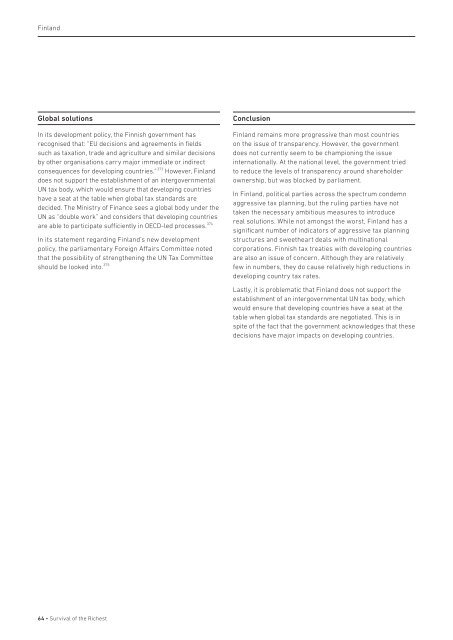You also want an ePaper? Increase the reach of your titles
YUMPU automatically turns print PDFs into web optimized ePapers that Google loves.
Finland<br />
Global solutions<br />
In its development policy, <strong>the</strong> Finnish government has<br />
recognised that: “EU decisions and agreements in fields<br />
such as taxation, trade and agriculture and similar decisions<br />
by o<strong>the</strong>r organisations carry major immediate or indirect<br />
consequences for developing countries.” 373 However, Finland<br />
does not support <strong>the</strong> establishment <strong>of</strong> an intergovernmental<br />
UN tax body, which would ensure that developing countries<br />
have a seat at <strong>the</strong> table when global tax standards are<br />
decided. The Ministry <strong>of</strong> Finance sees a global body under <strong>the</strong><br />
UN as “double work” and considers that developing countries<br />
are able to participate sufficiently in OECD-led processes. 374<br />
In its statement regarding Finland’s new development<br />
policy, <strong>the</strong> parliamentary Foreign Affairs Committee noted<br />
that <strong>the</strong> possibility <strong>of</strong> streng<strong>the</strong>ning <strong>the</strong> UN Tax Committee<br />
should be looked into. 375<br />
Conclusion<br />
Finland remains more progressive than most countries<br />
on <strong>the</strong> issue <strong>of</strong> transparency. However, <strong>the</strong> government<br />
does not currently seem to be championing <strong>the</strong> issue<br />
internationally. At <strong>the</strong> national level, <strong>the</strong> government tried<br />
to reduce <strong>the</strong> levels <strong>of</strong> transparency around shareholder<br />
ownership, but was blocked by parliament.<br />
In Finland, political parties across <strong>the</strong> spectrum condemn<br />
aggressive tax planning, but <strong>the</strong> ruling parties have not<br />
taken <strong>the</strong> necessary ambitious measures to introduce<br />
real solutions. While not amongst <strong>the</strong> worst, Finland has a<br />
significant number <strong>of</strong> indicators <strong>of</strong> aggressive tax planning<br />
structures and swee<strong>the</strong>art deals with multinational<br />
corporations. Finnish tax treaties with developing countries<br />
are also an issue <strong>of</strong> concern. Although <strong>the</strong>y are relatively<br />
few in numbers, <strong>the</strong>y do cause relatively high reductions in<br />
developing country tax rates.<br />
Lastly, it is problematic that Finland does not support <strong>the</strong><br />
establishment <strong>of</strong> an intergovernmental UN tax body, which<br />
would ensure that developing countries have a seat at <strong>the</strong><br />
table when global tax standards are negotiated. This is in<br />
spite <strong>of</strong> <strong>the</strong> fact that <strong>the</strong> government acknowledges that <strong>the</strong>se<br />
decisions have major impacts on developing countries.<br />
64 • <strong>Survival</strong> <strong>of</strong> <strong>the</strong> <strong>Richest</strong>


